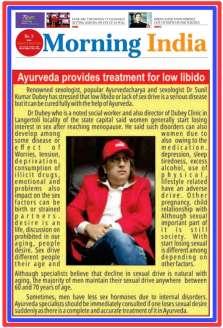



















KNOW ABOUT CHRONIC ERECTILE DYSFUNCTION… THIS IS THE THIRD STAGE OF ERECTILE DYSFUNCTION WHICH IS VERY COMPLICATED AND WORST CONDITION FOR A PERSON. IN THIS CONDITION, THE PERSON IS COMPLETELY UNABLE TO GET OR MAINTAIN A FIRM ERECTION TO PERFORM IN HIS SEXUAL ACTIVITY.
IN INDIA, ABOUT 12-15% PEOPLE ARE STRUGGLING WITH THIS CHRONIC ERECTILE DYSFUNCTION.









Chronic erectile dysfunction (ED) refers to the persistent and continuing inability to achieve or maintain an erection firm enough for satisfactory sexual activity.

World-renowned Ayurvedacharya Dr. Sunil Dubey says that chronic erectile dysfunction always refers to the period when a man is unable to achieve or maintain his erection for intercourse for more than 12-15 weeks. It is a continuum of sexual dysfunction where the person struggles with his erection problem in most of his sexual encounters.
Unlike mild or moderate erectile dysfunction, where problems may be occasional or less severe, chronic erectile dysfunction implies that the problem is a persistent and distressing part of a man's life, significantly affecting his sexual function, self-esteem, relationships, and daily life.


Dr. Sunil Dubey, the best sexologist in Patna, Bihar says that there are some characteristics of chronic erectile dysfunction in men, which is listed below.
Persistent inability: Difficulty getting or maintaining an erection is persistent and is not just an occasional occurrence.
Significant impact: It prevents regular, satisfying sexual intercourse.
Often a sign of underlying health problems: While psychological factors can play a role, chronic ED is often linked to more serious and long-standing physical health problems.







Chronic Erectile Dysfunction is often a symptom of an underlying medical condition that develops over time in a person's sexual life. These include:
Cardiovascular disease: This is one of the most common causes. Atherosclerosis (hardening and narrowing of the arteries) can significantly impede blood flow to the penile. ED can be an early warning sign of heart disease, sometimes appearing years before other cardiovascular symptoms.
Diabetes: Chronic high blood sugar levels can damage blood vessels and nerves throughout the body, including the blood vessels needed for erections.
High blood pressure (hypertension) and high cholesterol: These conditions contribute to atherosclerosis.
Neurological disorders: Conditions that affect nerve signals, such as Parkinson's disease, multiple sclerosis, strokes, or spinal cord injuries, can disrupt communication between the brain and the penis.
Hormonal imbalances: Though less common as a sole cause, chronic low testosterone (hypogonadism) can contribute to chronic ED, as well as decreased libido, fatigue, and other symptoms.




Peyronie's disease: This condition causes fibrous scar tissue to develop inside the penile, leading to painful and often curved erections, which can make intercourse difficult or impossible in a person.
Chronic kidney disease or liver disease: These systemic diseases can affect a variety of bodily systems, including sexual function. Due to this health concern, sexual function is affected and a person experiences difficulty in achieving erection.
Certain medications: Long-term use of certain medications, especially those for high blood pressure, depression (SSRIs), prostate conditions, and some anxiety medications, can cause chronic Erectile Dysfunction.
Smoking use: Smoking severely damages blood vessels and impairs blood flow in body. This lifestyle affects the sexual health and its function.
Alcohol and recreational medicines: Frequent heavy drinking and recreational medicines can have a detrimental effect on erectile function in men.
Obesity and metabolic syndrome: These conditions are strongly linked to heart disease and diabetes, which are major risk factors for Erectile Dysfunction in a person.
Pelvic surgery or radiation: Procedures for prostate cancer, bladder cancer, or colon cancer can damage nerves and blood vessels important for erections






























Dr Sunil Dubey says that since chronic ED often points to a deeper physical problem, treatment usually involves a comprehensive approach:



This is the most important step to deal with chronic erectile dysfunction. Treatment and management of conditions such as diabetes, heart disease, and high blood pressure is fundamental to improving ED in men. That's why, sexologist doctor helps the patient to deal with these underlying health conditions during the sexual therapy.

Adopting a healthy lifestyle (diet, exercise, smoking cessation, limited alcohol) is always recommended and can greatly improve a man's overall health and erectile function. Living a healthy prosperous life is also a natural duty.

This is a natural system of medicine based on improving overall health, including sexual problems. These Ayurvedic treatments are safe and 100% effective and work by increasing blood flow the penile when sexually stimulated





Ayurvedic Treatment and other medical intervention
Ayurvedic Treatment:


Herbal Remedies
Ayurvedic Bhasma
Naturopathy Approach
Psychological counseling:






Facebook | Twitter | Instagram | Threads | Quora | YouTube | LinkedIn | Dailymotion | Sound | Dubey Clinic
It's important for men with chronic Erectile Dysfunction to get a medical evaluation. A healthcare provider (sexologist doctor) can perform a thorough assessment, identify underlying causes, and develop an individualized treatment plan.



